The name change – even if April Foolsey – is indicative of what this change is all about.
The Volkswagen was – literally – the people’s car. It was Germany’s open emulation of America’s people’s car, the Ford Model T.
In terms of their looks and layouts, they were as different as a square and a circle. Henry’s car had a water-cooled, inline four cylinder engine up front powering rear wheels, out back. It was angular and upright and jacked up off the ground – to enable travel over America’s then mostly dirt roads.
The Beetle – as the first Volkswagen was affectionally called – had its air-cooled horizontally opposed four cylinder engine mounted in the rear – on top of the rear wheels – and it was as round as the T was not.
It sat low, to take advantage of aerodynamics and Germany’s new system of Autobahns, which predated America’s Interstates – which emulated them – by more than 20 years.
Yet both reflected the same wonderful concept, that of putting people behind the wheel. Which opened up not just the road but possibilities that average people of modest means had never previously had. With a people’s car – whether it was the Model T or a Beetle – the people were mobile. Just like that, they were freed from the necessity of having to stay put – or stay close. They could live at a distance from where they worked. They did not have to consider the proximity of the bus stop or the train station to either.
Most of all, they were no longer riding – and waiting – on the government’s transportation schedule. They were able to come – and go – as they liked, whenever they liked.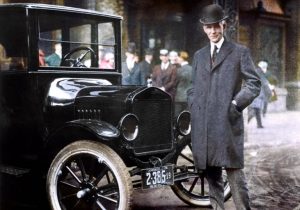
And go wherever they liked.
Neither car was fast – although the Beetle was capable of a higher top speed, around 60 MPH for the original 1930s version vs. about 45 for the T – with a tailwind. And both were basic, even by the standards of nearly 100 years ago.
But that was intentional. Both cars were designed to be inexpensive so that more people could afford them.
Practically anyone, in fact.
Both cars not only put a generation of people behind the wheel, they put future generations behind it, too. The Ts and Beetles purchased new by the former were hand-me-downs to the latter, providing those people with even more affordable mobility.
For many people, a used T or Beetle was their first “new” car – in the case of the Beetle, well into the ‘80s and even the ‘90s as old Beetles were still commonly available for next to nothing up to then. Your Libertarian Car Guy drove one during and after college – a ’74 Super Beetle – which was purchased for $700 in the early ‘90s.
It enabled me to work and save the money I earned, rather than spend it on a car payment to be able to go to work. Whenever it needed work, I was able to fix it – often without having to spend anything. It helped me buy my first house. And – these tangibles aside – it created cantankerous memories I cherish to this day, including the time the hood came unlatched on the highway and flew up against the windshield – the 1930s version of Drowsy Driver Alert.
I sold that car for about what I paid for it – and another person was put behind the wheel.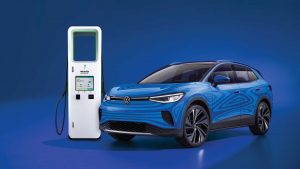
The Volstwagen and its electrified ilk will reverse all of this – because most people cannot afford them.
A Voltswagen – the pending ID.4 – has a base price of $40,000 ($39,995 to be precise). This is equivalent – in Volkswagen terms – to the cost of four 1965 Beetles, which sold for about $1,400 brand-new back in 1965, equivalent in today’s money to about $11,000 each.
Yes, of course – the Voltswagen comes standard with amenities the Volkswagen never offered, such as air conditioning and glowing electric screens to peck at. All of which is beside the point if people cannot afford it – and most people cannot afford to spend $40,000 on a car.
Which is roughly twice the price of many non-electric economy cars.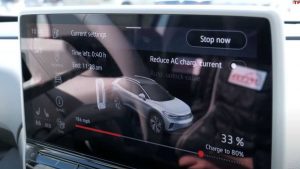
The Voltswagen is also not owner-serviceable. There will be no Manual for the Compleat Idiot – a reference that will be familiar to anyone who ever owned a Volkswagen. Apologists for the Voltswagen tout the elimination of the need to change engine oil and other grubby procedures. But when the Voltswagen does need a procedure, it’s off to the dealer.
Which – again – is no problem if you can afford to pay the dealer. How many people can?
The Volkswagen was for people who couldn’t.
It kept them on the road that way – instead of in the poorhouse. Younger people, especially. An old Volswagen was their ticket not to ride but to drive, without going broke. It empowered them financially as well as individually. They were no longer dependent on others for a a ride – or the government-corporate nexus for “mobility.”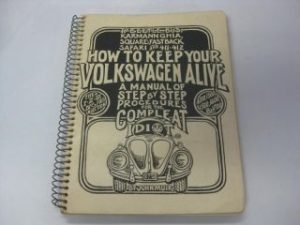
Volkswagens aged well. There are probably still more of them in driveable shape today than there are electric cars – notwithstanding that VW hasn’t sold a new old Beetle in the United States since the late ’70s, which was a long time ago.
The Voltswagen won’t last a long time because it isn’t designed to. Batteries are inherently disposable and when it costs as much as a Volkswagen once cost to by a new battery for a Voltswagen, most people will not . . . because they cannot afford to.
Which will make the Voltswagen disposable.
It’s a shame what we’ve lost. What’s been taken away.
Volkswagen – the company – had been building new Volkswagens until quite recently. A whole line of affordable people’s cars with stupendous range (700-plus highway miles) and no wait plus Beetle-like longevity due to their being powered by diesel engines. These were available for a little more than half the price (about $22,000 as recently as 2015) of the 2021 Voltswagen. 
Volkswagen had another one in the works, too – a small, diesel-hybrid powered commuter car that was expected to be capable of 240 MPG and which – had it ever been mass-produced – would probably have cost a great deal less than the Voltswagen, as its diesel-hybrid engine is (was) much less inherently expensive than the Voltswagen’s all-electric drivetrain.
It was small, it wasn’t laden with amenities.
But it was – it would have been – affordable (as well as practical) and thus a modern people’s car.
Instead, the people will get the Voltswagen. Which most of them won’t, actually. Because most of them won’t be able to afford it.
. . .
Got a question about cars, Libertarian politics – or anything else? Click on the “ask Eric” link and send ’em in!
If you like what you’ve found here please consider supporting EPautos.
We depend on you to keep the wheels turning!
Our donate button is here.
If you prefer not to use PayPal, our mailing address is:
EPautos
721 Hummingbird Lane SE
Copper Hill, VA 24079
PS: Get an EPautos magnet or sticker or coaster in return for a $20 or more one-time donation or a $10 or more monthly recurring donation. (Please be sure to tell us you want a magnet or sticker or coaster – and also, provide an address, so we know where to mail the thing!)
My eBook about car buying (new and used) is also available for your favorite price – free! Click here. If that fails, email me at [email protected] and I will send you a copy directly!


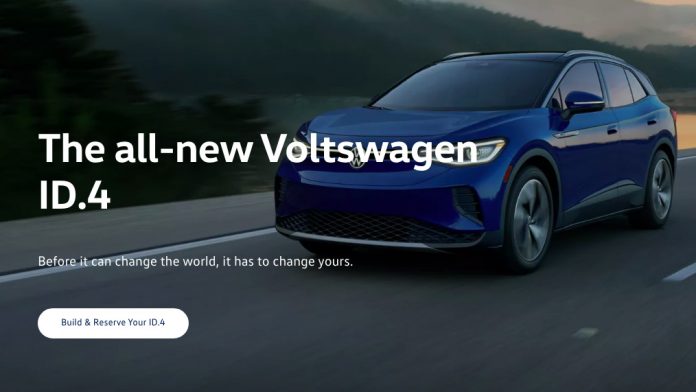









Seems like just the other day VW was saying diesel is the future. They were selling more TDI’s than ever, then it all came crashing down. They lost that battle and have survived. The last EV they made was cleared out at dealers for cheap since they didn’t sell. Guess we will see how this one turns out.
Remember that Germany is deep in the throes of Energiewende, which apparently translates into “denial.” They believe in the heart of hearts that if they only cover even more land with solar panels, even more shoreline with wind turbines, and click their heels together a little more, they’ll have a zero carbon future.
Germany has traditionally had problems securing a supply of fossil fuels. The state has little to no reserves, so they have to go elsewhere, namely the Middle East. I recall seeing a documentary years ago that posited the real cause of World War I was construction of the Berlin to Bagdad railroad, which would have bypassed the French and British controlled Suez Canal. Suddenly Germany was on the shit list, just before it was completed. And during World War II the eastern front was lost when the Panzers ran out of fuel. Anyone promising energy independence for Deutschland is probably going to be pretty popular.
Hi RK,
Germany could obtain vast quantities of natural gas especially from Russia, via pipeline. But your point regarding keeping Germany in line is apt. It was the real motive behind the vicious treatment of Germany at Versailles. England and France felt economically threatened (pre-war) by a rapidly industrializing Germany, which was on course to become if not the dominant economic power on the continent, on par with the others.
The Kaiser – being an inbred (literally) idiot – fell into the trap and Germany paid the price.
As prices rise & choices decline, an unruly underclass will be created.
Check through history. An unruly underclass is often the fall of their current ruling class.
Why do they want all electric everything? Don’t know, maybe they think electricity is magic.
the result of mandated expense will be a lot more have nots who will eventually tire of not having.
Why do they want all electric? Because Al Gore told them the world would end. Then Amory Lovins told them we could save the world by running everything on a few square miles of solar panels.
They don’t talk to engineers, because the engineers are a bunch of jerks who explain why Al and Amory are idiots.
https://rmi.org/people/amory-lovins/
Hi RK,
Yup. So many facets to this mess but one that’s so obvious – and so generally ignored – is the basic logistical problem of quintupling (at least) the time it takes an EV to “refuel.” Even if it only took twice as long – say 10 minutes – that still presents massive throughput and other, related problems that would trickle throughout the economy.
Delays have costs – but almost no one wants to discuss this.
Hi Dan,
My take – briefly- is that “electrification” is being pushed out of a combination of useful idiotry and malevolence. The former are fools who do not understand things like math and economics and engineering; who think in terms of how they feel. The latter know better – and are using the useful idiots to advance electrification as their preferred means of controlling and impoverishing the middle and working classes especially.
Eric – On a slightly different note – not sure if you saw this – “Top US Auto Group Calls For Lawmakers To Beef Up Chip Production Amid Shortages” (https://www.zerohedge.com/markets/top-us-auto-group-calls-lawmakers-beef-chip-production-amid-shortages)
Sometimes I really dont get who is more lost in western society – the government and politicians or the big corporates ! I mean if there is a chip shortage what on earth will “lawmakers” do to fix it !! mandate everyone start making chips ??? Really shows the sad state of thinking – if theres a problem go to government to fix it !!
And once we enter the world of electric cars which are even more complicated – god help the car companies if the supply of even one of the tiniest components or chemicals/elements doesnt show up on time….
As one of the tiny minority who has owned and driven both model T Fords and air cooled VW’s I absolutely agree with Eric in this article.
The model T is sneered at today for its primitiveness and its 20mph cruise speed. But having restored and driven them I can say that they were a magnificent achievement and a very apt technology for the conditions. They had amazing flexibility and suspension travel and high ground clearance and still work incredibly well on primitive or nonexistent roads. Their 4:1 compression wasn’t great for “efficiency” but they would run on anything combustible including lamp oil and moonshine (literally). They were carbon steel and cast iron creatures which any blacksmith or farmer could make go, and very quickly there were junkyards where cheap parts from extensively damaged ones could keep functional ones alive.
The air cooled VW was the same concept. Cheap to own, run, and keep running. Limited performance if speed is your only metric, but extremely high performance where economy matters.
There is nothing like these today. If it has plastic, it simply doesn’t count. If it requires expertise beyond welding and turning wrenches, it doesn’t count. The Roxor comes close but I almost cried to see an electronic diesel in it.
Vehicles like these, and carbureted motorcycles are literal freedom machines.
Just more induction coils…induction coils. This is a high-voltage transformer with a protection gap at the top, so the voltage doesn’t go too high and burn the coil out.
This is an induction coil with a vibrator here.
Fred – “Oh, is that a bit like a Model T ignition coil?
Same thing, exactly. Even a modern automobile has a spark coil, you know.
…Years and years ago, when amateurs were doing things by spark, they would get a big transformer…high-voltage spark gap, and just put a key in there, make a lot of static, and…it’s surprising…
Fred – “Try not to electrocute themselves…”
Well, they learn a lot.
https://newsm.org/wireless-e/spark-transmitters/
Thanks, Ernie!
I’ve owned several old VWs – and driven a T! I cannot say enough in praise of the old VWs, which put young/broke me on wheels and also many of my Gen X cohort. No heat, not much power- but so much freedom!
It’s unfortunate VW didn’t have the balls to stand up and present the facts about Dieselgate instead of dropping to its knees with its mouth open. I can’t think they will still be in the car business in 15 years. Toyota is the only manufacturer which has presented the facts about electric vehicles but all others are touting the virtues of the electrification folly while ignoring the basic law of supply and demand. Don’t they realize, as they slowly commit suicide, the Governments of the Forth Reich are encouraging them to do so?
Hi Doug,
Yup. Caving to bullies is a sure route to endless bullying. Some inside baseball: At the time – when the “cheating” was uncovered – I urged VW people I knew to fight. To hire top-tier PR people to present the facts to the public. But upper management didn’t have any stomach for it.
It’s a tragedy that makes me angry every time I think about it.
My question is, short of the ptb blocking all oil production and importation in the us and demanding at gun point you give up your 10 or 15 yr old gas powered car, which i think would lead to a whole host of other issues that the govt will be ill prepared to deal with,what happens when almost noone buys these abominations? You can mandate ev’s until your blue in the face but if noone outside of the beltway elite can afford them and noone who is not a complete left wing eco wack job wants to drive around in one, the car companies will go belly up very quickly. Also with the border as wide open as the left wants it, if the ptb did ban importation and drilling for oil, there will be more money in smuggling gas than drugs north from mexico.
Hopefully this is where people like the CEO of Toyota come in. The only car manufacturers who seem to have any sense of reality are the Japanese- so in this big world after the social justice communists utterly destroy and depopulate the USA and Europe, you will be able to buy a peoples car with Japanese nameplates.
Of course we could all grow a set and just say no to insanity. Refuse to obey and band together to get out brothers out of the clutches of the enforcers. It is going to happen at some point, the only question is how much evil will happen before the huevos regrow and men reassert reason and values in western society.
Eric – maybe something to do a bit of research on. Some time back I heard Jordan Peterson say on a podcast that one of the reasons for the fall of the soviet union and communism was increased access to cars and the sense of individual freedom and change in mindset it gives a person. I havnt been able to find his source on this – but it would be interesting to know to what extent this is a contributing factor. Ofcourse if our dear leaders want us to go back to the days of a new soviet era – first thing to do is get rid of the car !! And you can see that in many parts of the (western) world they have very successfully done that (say the UK where car ownership amongst the young is extremely low, and therefore a more collective mindset than ever, easily controlled and manipulated by those above!)
Nasir,
“– first thing to do is get rid of the car !!”
No.
I’m pretty sure the first thing occurred the day after the announcement that the Berlin Wall was to officially come down.
The first thing was making it legal for Soviet style checkpoints in the land of the “free.”
‘The people will get the Voltswagen. Which most of them won’t, actually. Because most of them won’t be able to afford it.’ — EP
Do we detect a pattern here? Consider:
Big Gov got into medical care, big time, with Lyndon B*tthole Johnson’s Medicare and Medicaid. Now the US has the costliest medical care on the planet, by a very long shot. We are all HIPAA to that crap.
Likewise, Clowngress created two captive quasi-private entities, Fannie Mae and Freddie Mac, to expand and securitize the mortgage market along with the FHA. Thanks to gov-subsidized ‘cheap’ finance, housing is now astronomically expensive.
Then there’s public schools, once modest local enterprises, now heavily federalized with everything from IDEA to Title IX to No Child Left Behind. The result? Modest cottages in some blue states can attract $25,000 annual property tax bills. Likewise, college tuition launched skyward like a Saturn V rocket thanks to the fedgov’s trillion-dollar student loan racket.
Now Big Gov is out to ‘fix’ private cars the same way they ‘fixed’ medical care, housing and education — by regulating them into unaffordability, even as a remnant of decent Americans resists its ghastly, alien Revenge of the Bidenoids.
We’ve got the guns; they’ve got the money printer going Brrrrrrrrrrr.
Counterfeiting once was a capital offense …
In 1910 the government began its partnership with the medical industry to increase prices. As prices increase beyond what people can afford to mechanisms are developed to socialize the high prices. JBJ’s medicare was one of those patches.
All the things where we have these very high prices is because high prices were the goal. It was always about wealth transfer, not helping people.
Yes, people forget that medical care was once very affordable.
Many civic organizations once even employed doctors for the benefit of their members.
Excellent points and solid argument here, EP.
It makes me wonder what VW would be like had the faux “dieselgate” event never happened. In some ways perhaps they would be more interested in making vehicles consumers want rather than what politicians want consumers to want. This so-called scandal likely had ripple effects throughout the industry as other automakers saw the lesson being taught to VW as an example of what will happen to them if they dare disobey in the slightest the arbitrary and constantly changing whims of their real masters.
It seems the goal is ultimately to eliminate all private transportation. Instead, we all must be collectivized into mass transit, faceless blobs of material to be controlled and exploited. Hold an unapproved opinion? Oh, look, your metro card just got revoked and you can’t go to work or the grocery store. Think an independent thought and have the audacity to say it out loud as a business owner? Now your business just lost its nearest bus stop. How very 1984. Perhaps they should be renamed “Orwheels” after the author.
It’s not that touch screens and other luxury features are bad. There’s clearly some market demand for them. Yet there is also demand for simple, inexpensive, basic transportation that can be worked on under a shade tree and be kept running for decades rather than disposable vehicles costing two or three times as much. There is no reason, with the current state of manufacturing technology, that a simple car with a basic carbureted engine that carries five people couldn’t be built for under $10k today. The market for such a car would likely be huge, yet they are effectively outlawed by safety mandates, fuel economy mandates, etc.
Leave it to politicians to turn a symbol of freedom into a symbol of enslavement.
Side note: If you haven’t seen it, you should watch the film “The Last Motorcycle on Earth” on Amazon Prime. It’s a story very much in line with libertarian thinking about a near future America where all gas engines vehicles are slated to be destroyed starting with motorcycles. It’s well written, even if acted poorly. The point of the story is what counts.
When VW got caught manipulating emissions data so that their superior approach to diesels could continue, they could respond in a number of ways. One would be as Eric suggested, to explain why they were doing what they were doing and to fight it.
Somewhere in there, they did some goofing around with electric vehicles. Without really trying, they put together an electric vehicle that set and shattered records on the most challenging courses in the world (Pikes Peak, Nuerburgring, Goodwin, Tianmen Mountain). Google Volkswagen ID.R for details.
VW chose a different approach. They conceded and handed over a stack of money in fines. The fines went to support transportation electrification. They designed a battery pack in the revolutionary spirit of Volkswagen (Beetle, Rabbit). Most significantly to me, it should be safer than early electric vehicles; as of early 2020, Teslas caught on fire at the same pace as Ford Pintos. I drive dirt roads and roads with bad clearances. I definitely will wait for a VW with a well-protected battery system.
The controls have been more challenging than VW anticipated. But VW very much sees its EVs as ID.3, a worthy successor to the Beetle and Rabbit.
Hi Jeff,
Here’s the problem, though: The ID.3 (which isn’t sold here) costs about $33,000 to start. Most people cannot afford to spend what is very close to being “entry-luxury” money on a car. And if they can, then economy is not especially relevant. The original Beetle was meant to be an affordable car for the masses; the Rabbit was a worthy successor to that. Even the last iteration of the Beetle (water-cooled/front-engined) cost about $10,000 less to start than the ID.3 and unlike the ID.3 did not impose long waits on its owner to get moving again.
VW is at the leading edge of returning the car to what it was before the Beetle and the Model T: An indulgence of the affluent.
Hi Eric,
I agree with you on this point, but wanted your readers to know why (I think) that VW went in the direction that it did. It is a gamble, to be sure; but they read the table as best they could, and played the cards that they had.
Here’s why I know the story.
We buy a new car about every ten years. We were due in early 2019 when we were concerned that our 2010 (bought in ’09) Scion xB was going to start costing us money. There was a great deal on offer for a 2018 VW Sportwagen, which could be a decent replacement for the xB. I started researching VW and was really impressed with their vision for EVs. We did buy the Sportwagen [with a 10 year platinum service plan, in case VW reliability isn’t that of the Toyota]. Even with it, we spent maybe $20K on the car ($18K for the Sportwagen, with a hefty service plan payment). I believed strongly that the next car we bought would be an EV, and probably a VW.
The Sportwagen is a manual, and our kids will be learning to drive soon. I need a car for work for a week a month, and we’re a one-car family, so we decided to buy a second car late last year.
We ended up buying a Kia Forte; also for $18K. I don’t trust EVs on the roads that I drive for work (no incineration, please), plus it’s 400 miles to get to work. And, why pay $28K for an EV when I can get an IC car for $18K? The EV will wait until “next time,” again.
I value your website and your courage to share your wisdom. Thanks!
Jeff Cook-Coyle
Fort Collins, CO
I, too, wish that VW chose to fight Dieselgate. VW was building diesels, and cheating the way that they did, because they saw them as the best solution, environmentally. They were trying to maximize mileage at the expense of some other pollutants.
Some day we will wish that they had the courage to go the 250 mpg diesel/hybrid route. The revisions to electrical distribution required for EVs will be impossible; to say nothing about the required generation. There are also the heat and cold degradation issues for batteries.
The only cars faster at Nuerburgring than the ID.R is the (Volkswagen-family) Porsche hybrid with electric motors on each wheel, along with an IC engine. VW/Audi/Porsche engineers know that this is the best solution. But the tides of public sentiment are flowing out from that model. VW’s pockets aren’t that deep. They couldn’t wait ten years for people to figure that out, like Toyota can.
Thanks again for fostering great conversation.
By the way, we love the Sportwagen and are happy enough with the Forte.
We just took the Sportwagen on a Western road trip. With four people, two dogs, and a fully loaded “wagen,” we averaged 38 mpg at 80 mph for 1500 miles. It is comfortable, fun to drive, has great acceleration and handling, and can carry 22 moving boxes. It looks like an “estate wagen,” really classy. It is easy to forget, seeing it in the driveway, that we bought it because we wanted an affordable car that could carry all those boxes. What an extraordinary car.
Personally, I am glad that VW is trying to evolve and to stay in business. In the mean time, we plan to enjoy the Sportwagen.
Hi Jeff,
But VW isn’t “evolving” – i.e., responding to natural market forces. It is becoming a Woke, virtue-signaling adjunct of the government – which wants to make driving less and less affordable and put more and more people into government transport.
The agenda is both craven – and ugly.
PS: Thanks for the kind words and thoughtful posts!
One last point: isn’t the median sale price for new vehicles in the $35K range? I think that was part of VW’s bet: the average person is willing to spend that much on a car. (For better or worse: I’m not.)
Cheers.
Jeff
Hi Jeff,
The average price paid is, indeed,in that range. But what has that to do with affordability? It just means many people are willing to enserf themselves to the now-average 5-6 year car loan; i.e., assume more debt. In this case, on a car that is inherently more disposable than a non-electric car because of the nexus of EV battery life/depreciation of value of the car itself and the cost of a replacement battery – which the car will require long before the average 15-20 year service life of the average non-electric car.
$33k is almost twice the cost of entry-level non-electric subcompacts like the Hyundai Accent and Mistu Mirage – which are the true inheritors of the spirit of what VW used to stand for.
And as you point out in your recent columns on the Corolla and Elantra, you can get a really nice car for not much more; heck, we’ve bought two cars for less than $20K recently that are great cars.
But VW discontinued the Sportwagen in the States; customers are lining up to spend $35K while great options for little more than half of that wither on the vine. But I expect demand to be high for these cars in ten years when we sell them, because they will stand the test of time.
Ha, two more “last comments.”
I didn’t have the benefit of your Elantra review when we bought the Forte. I like the Forte for many of the reasons that you state, although I would definitely have welcomed your opinion.
Second, the western road trip went over the same roads that sunk my family’s Oldsmobile Delta 88 in a family road trip in 1981. The electronic engine operation worked a whole lot better than the unadjusted carburetor did back then.
The great Jason Torchinsky over at Jalopnik concluded this after getting a demo ID.4 for 4 days:
I think, really, I made my take on the ID.4 pretty clear at the start of this review: It’s a well-executed, competent EV that will handle most people’s basic car needs just fine.
As you said, all for a $33K AFTER the $7K tax rebate.
Pretty lame for a revolution, I agree.
Hi Jeff,
Yup. If Torchinsky thinks $33k (!) “will handle most people’s basic car needs just fine” he’s either out of touch – or a tool.
You know what handles most people’s basic transportation needs just fine? A $14k Mitsubishi Mirage or Nissan Versa.